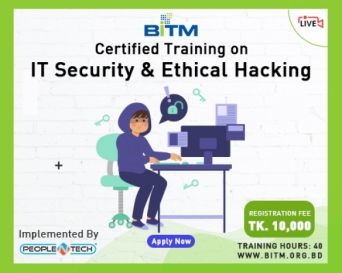- +8809612342486
- [email protected]

This is the world’s most advanced ethical hacking course with 20 of the most current security domains any ethical hacker will ever want to know when they are planning to beef up the info security.
Class- 1
Information security basics:
Understanding hacking/ethical hacking concepts and scope
Concepts of policies, procedures and awareness
Footprinting:
Footprint using advance google hacking techniques
Footprinting uisng recon-ng
Footprinting uisng Dmitry
Scanning:
Scanning techniques using hping3/nmap
Advance scanning using Nmap Scripting Engine (NSE)
Class- 2
Gaining access – server side attack:
Basic information gathering and exploitation
Code Execution vulnerabilities to hack into remote server
Steganography (image steganograpy/email steganograpy /space steganograpy /ADS)
Gaining access – client side attack:
Generating undetectable backdoor using VEIL framework
Listening for incoming connections
Basic delivery method to test and hack windows
Class- 3
Gaining access – client side attack – Social Engineering:
Backdooring any file types (images/pdfs etc)
Compiling and changing trojan’s icon
Spoofing .exe extension to any extension (pdf/jpg etc)
Post exploitation:
Maintaining access – basic method
Maintaining access – using reliable and undetectable method
Class- 4
Website hacking – information gathering:
whois lookup
Discovering technologies in website
Discovering websites in same server
Discovering sensitive files
Analysing sensitive files
Website hacking – file upload, code execution, LFI:
Discovering and exploiting file upload vulnerability to hack website
Discovering and exploiting code execution vulnerability to hack website
Discovering and exploiting local file inclusion vulnerability to hack website
Class- 5
Website hacking – XSS:
Discovering reflected XSS
Discovering stored XSS
Cookie catching using XSS vulnerability
Changing of another user password using XSS vulnerability
Taking control of another user’s session
Class- 6
Website hacking – SQL Injection:
Discovering SQL injection in POST
Bypassing login using SQL Injection
Discovering SQL Injection using GET
Reading Database information
Discovering Database tables
Discovering SQL Injections and Extracting data using SQL Map
Class – 7
Network hacking – Pre-connection attack- WPA/WPA2 cracking:
Hacking WPA/WPA2 without wordlist
Cracking WPA/WPA2 using wordlist attack
Network hacking – Post connection attack – MITM attack:
ARP poisoning using Kali
Bettercap basics and sniffing
Bypassing HTTPS
Bypassing HSTS
Session hijacking using ettercap, harmster and ferret
Wireshark basics
Stealing password using Wireshark
Class -8
Website hacking – Discovering vulnerabilities Automatically:
Automatically scan target website for vulnerabilities
Analyzing scan result
Hacking mobile platform:
Trace mobile location
Generating undetectable backdoor to hack mobile
Generating backdoor using different tools
Using backdoor outside of local network
| Module | Online Training on IT Security & Ethical Hacking | 40 Hrs |